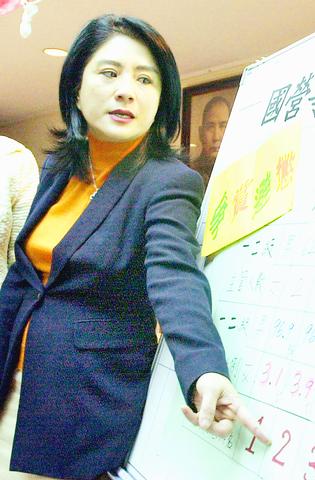The DPP Central Review Com-mittee yesterday decided to expel Legislator-at-large Chiu Chang (邱彰) from the party for allegedly spoiling her ballot in the legislative vice-speakership race on Feb. 1.
The party alleges that Chiu refused to show her ballot during the election, breaking a party resolution that required members to show how they voted. Chiu's refusal cast doubt on whether she had voted for the DPP candidate.

TAIPEI TIMES FILE PHOTO
In response to the committee's decision, Chiu's voting witness Wang Sing-nan (王幸男), also a DPP lawmaker, said the decision was based on personal feuds within the party and reiterated that Chiu really did vote for the party's candidate, Hong Chi-chang (洪奇昌).
Chiu was quoted by the Central News Agency as vowing to appeal the decision to the party's Arbitration Committee.
But Chiu told the Taipei Times yesterday that she would respond to the decision in a press conference scheduled for this morning.
The Central Review Committee's ten members met yesterday for a second time to discuss disciplinary measures for Chiu.
Among the three actions the party could have taken -- warning, suspending party membership and expulsion from the party -- eight out of the 10 members voted to oust her.
The eight members who voted to expel Chiu were Lee Chun-yee (
KMT candidate Chiang Ping-kun (江丙坤) won the Feb. 1 election for vice speaker over DPP candidate Hong by nine votes in a second round of voting after neither secured a majority in the initial round.
Three of the four invalid ballots from the first round are suspected to have been spoiled by DPP lawmakers. But the DPP has never been able to prove that Chiu really spoiled her ballot.
Chiu was accused during the last legislative session by former party caucus whips of violating party discipline by refusing to show her ballot to the DPP's voting witness and also for shouting on the legislative floor.
Although the party has no proof Chiu spoiled her ballot, the committee's decision was nevertheless applauded by former legislative whip Tsai Huang-liang (蔡煌瑯).
"Since she refused to show her ballot to the party's witness and there were four spoiled ballots, we have reason to suspect that she cast an invalid vote by deliberately spoiling her ballot. As every faction of the party has its representative present in the committee, how can anyone suggest the decision was based on electoral feuding? If everyone behaved like her, how would you expect the party to impose discipline on its members?" Tsai said.
If Chiu fails in an appeal, her legislator-at-large seat would be filled by former lawmaker Lin Wen-lang (

Several Chinese Nationalist Party (KMT) officials including Chairman Eric Chu (朱立倫) are to be summoned for questioning and then transferred to prosecutors for holding an illegal assembly in Taipei last night, the Taipei Police said today. Chu and two others hosted an illegal assembly and are to be requested to explain their actions, the Taipei City Police Department's Zhongzheng (中正) First Precinct said, referring to a protest held after Huang Lu Chin-ju (黃呂錦茹), KMT Taipei's chapter director, and several other KMT staffers were questioned for alleged signature forgery in recall petitions against Democratic Progressive Party (DPP) legislators. Taipei prosecutors had filed

Taiwan would welcome the return of Honduras as a diplomatic ally if its next president decides to make such a move, Minister of Foreign Affairs Lin Chia-lung (林佳龍) said yesterday. “Of course, we would welcome Honduras if they want to restore diplomatic ties with Taiwan after their elections,” Lin said at a meeting of the legislature’s Foreign Affairs and National Defense Committee, when asked to comment on statements made by two of the three Honduran presidential candidates during the presidential campaign in the Central American country. Taiwan is paying close attention to the region as a whole in the wake of a

President William Lai (賴清德) has appointed former vice president Chen Chien-jen (陳建仁) to attend the late Pope Francis’ funeral at the Vatican City on Saturday on his behalf, the Ministry of Foreign Affairs said today. The Holy See announced Francis’ funeral would take place on Saturday at 10am in St Peter’s Square. The ministry expressed condolences over Francis’ passing and said that Chen would represent Taiwan at the funeral and offer condolences in person. Taiwan and the Vatican have a long-standing and close diplomatic relationship, the ministry said. Both sides agreed to have Chen represent Taiwan at the funeral, given his Catholic identity and

NEW WORLD: Taiwan is pursuing innovative approaches to international relations through economics, trade and values-based diplomacy, the foreign minister said Taiwan would implement a “three-chain strategy” that promotes democratic values in response to US tariffs, Minister of Foreign Affairs Lin Chia-lung (林佳龍) said. Taiwan would aim to create a “global democratic value chain,” seek to capitalize on its position within the first island chain and promote a “non-red supply chain,” Lin was quoted as saying in the ministry’s written report to the Legislative Yuan submitted ahead of the legislature’s Foreign Affairs and National Defense Committee meeting slated for today. The Ministry would also uphold a spirit of mutual beneficial collaboration, maintaining close communication and consultations with Washington to show that Taiwan-US cooperation